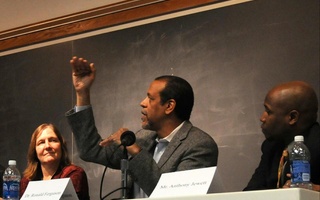In the face of international criticism, Harvard History professor Niall Ferguson apologized for his comments about John Maynard Keynes’ sexual orientation and its relation to his economic theories, prompting mixed reactions from the Harvard community.
Ferguson, whose past statements have created controversy, alleged at a recent conference in California that the economic theories of John Maynard Keynes were unsound because Keynes was gay and childless and, therefore, not concerned about the future.
In an apology posted on his blog Saturday, Ferguson wrote that his remarks were part of an “off-the-cuff response” and not part of his official presentation.
“My disagreements with Keynes’s economic philosophy have never had anything to do with his sexual orientation. It is simply false to suggest, as I did, that his approach to economic policy was inspired by any aspect of his personal life,” Ferguson wrote in the statement. “As those who know me and my work are well aware, I detest all prejudice, sexual or otherwise.”
Ferguson added that his remarks were “as stupid as they were insensitive.”
Griffin T. Gaffney ’13, an intern at the Harvard College Office of BGLTQ Student Life, said that the administration’s handling of the issue may have important implications regarding its support of the LGBTQ community. He said he hopes that the University will release an official statement regarding the matter, but added that he thinks that would be unlikely.
“This is a great example of the University not being responsive toward issues of gender and sexuality,” said Gaffney. “Historically, we haven’t really had a campus that is in tune with these kinds of issues.”
W. Powell Eddins ’16, a political co-chair in Harvard’s Queer Students and Allies, said that Ferguson’s comments may not reflect Harvard broadly, but that they point to lingering prejudices against the LGBTQ community.
“I think [this incident] is reflective of the fact that discrimination against the LGBTQ community in general is still pervasive in our society, even in places as progressive as Harvard,” he said. Still, Eddins said that he believes Ferguson’s apology may be a sign that prejudice is becoming less acceptable.
English professor Louis Menand said that the controversy was an academic integrity issue and not a matter of political concern.
“In historical inquiry, it is perfectly acceptable to use biographical information to explain an idea or a theory,” Menand wrote in an email to The Crimson. “It is unacceptable to rely on a stereotype or an unproven generalization, which is why Professor Ferguson retracted [his statement]. The matter has nothing to do with gay rights.”
—Staff writer Brianna D. MacGregor can be reached at bmacgregor@college.harvard.edu. Follow her on Twitter @bdmacgregor.
—Staff writer Yen H. Pham can be reached at yenpham@college.harvard.edu. Follow her on Twitter at @yhpham.
Read more in College News
As House Masters Prepare To Leave Pfoho, House Master Candidates VisitRecommended Articles
-
Professors Who Rock HarvardWhen History Professor Niall C. D. Ferguson begins his lecture at 10:07 a.m., he abandons the podium, choosing instead to ...
-
Ferguson Wins Emmy for DocumentaryHistory professor Niall C. Ferguson took home the International Emmy Award for “Best Documentary” last week for his six-part series, “The Ascent of Money,” which chronicles the history of money, credit, and banking from Babylon to the current financial crisis.
-
 Panel Discusses Education Gap
Panel Discusses Education Gap -
 Niall Ferguson in Literary Spat with London Review of Books
Niall Ferguson in Literary Spat with London Review of Books -
Cracks in LegalityIf Ferguson is indeed executed, it will lead to crippling effects on the credibility of the American justice system and open up doors for further unjust persecutions.
-
 Ferguson Apologizes for "Stupid" and "Insensitive" Comments About Keynes
Ferguson Apologizes for "Stupid" and "Insensitive" Comments About Keynes













